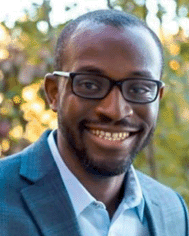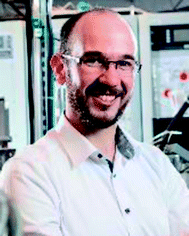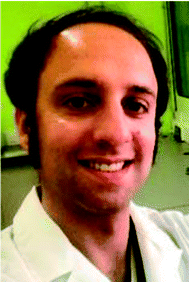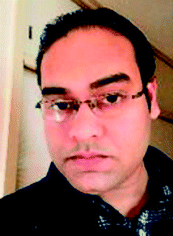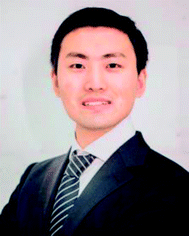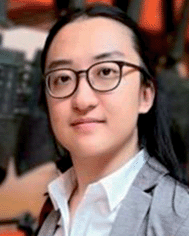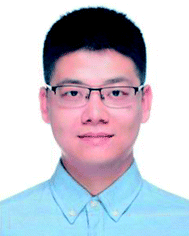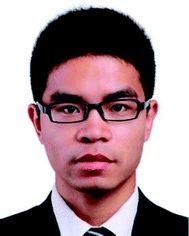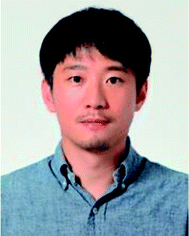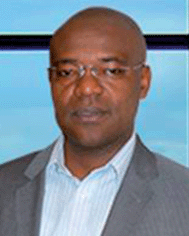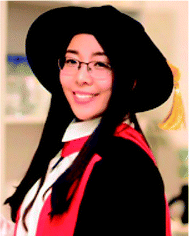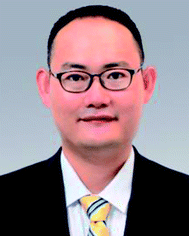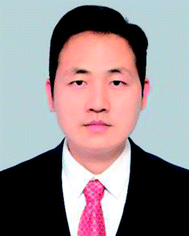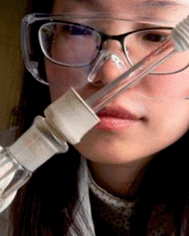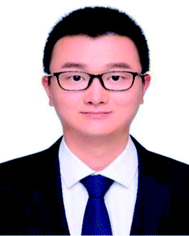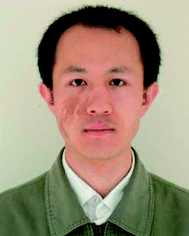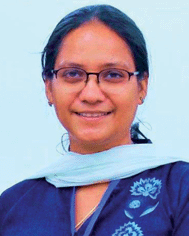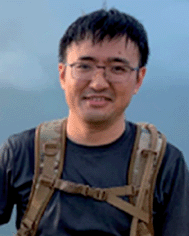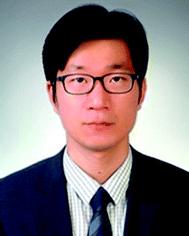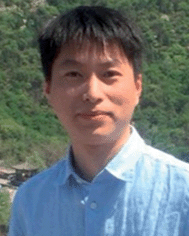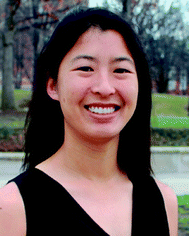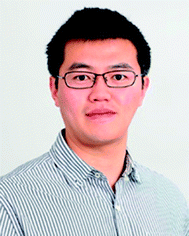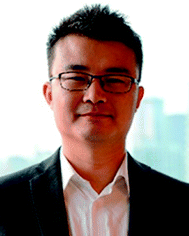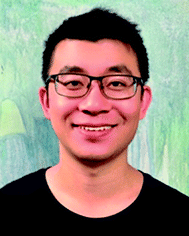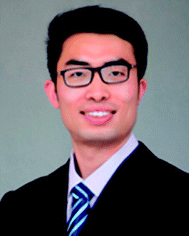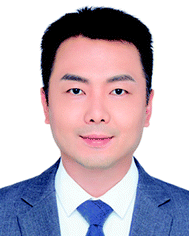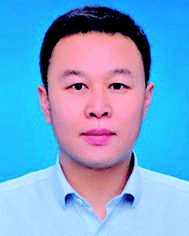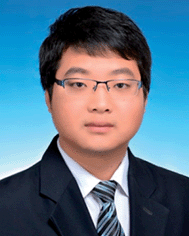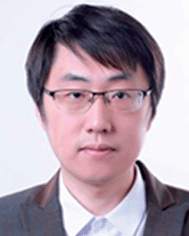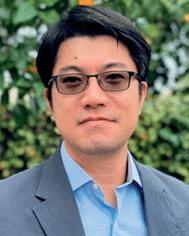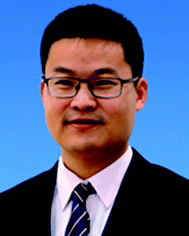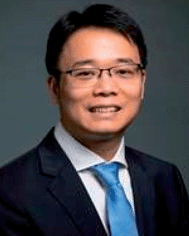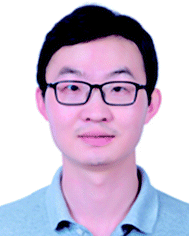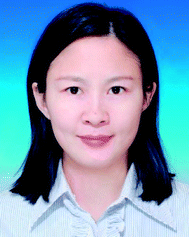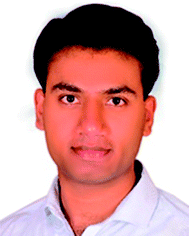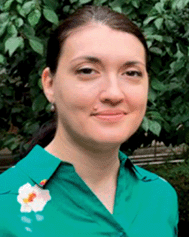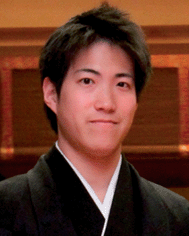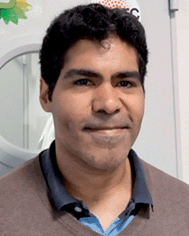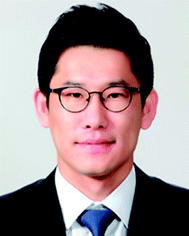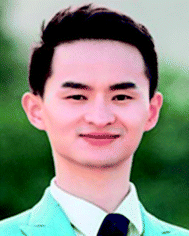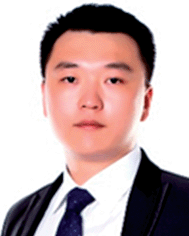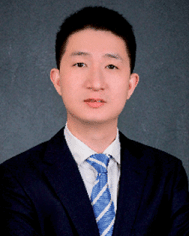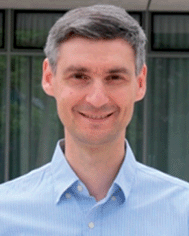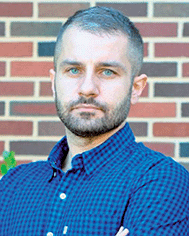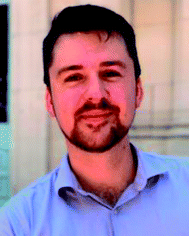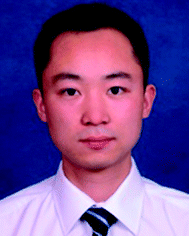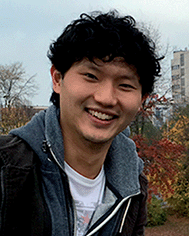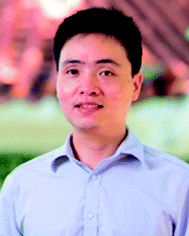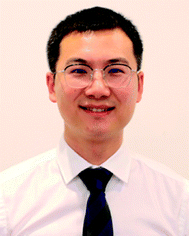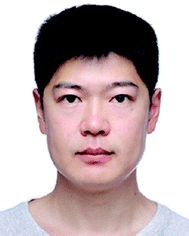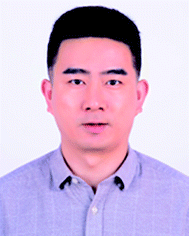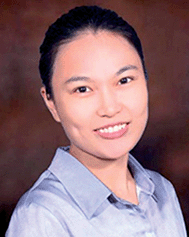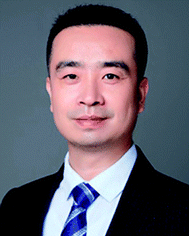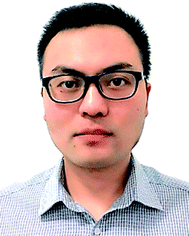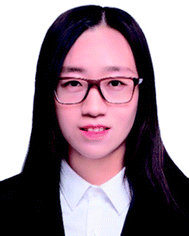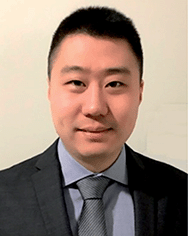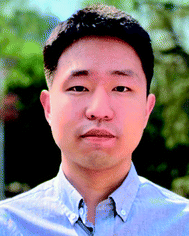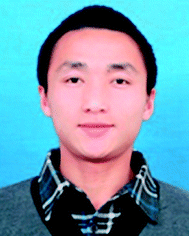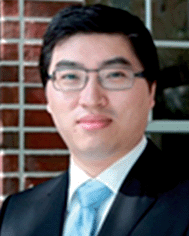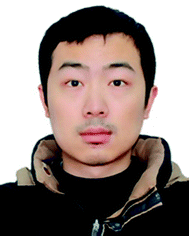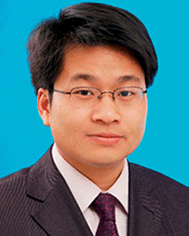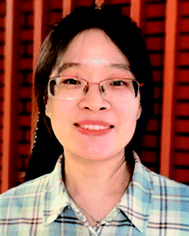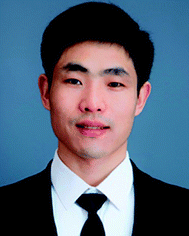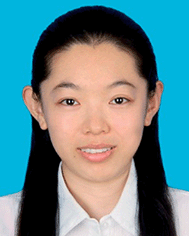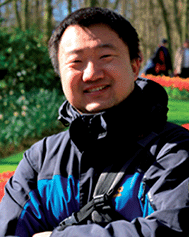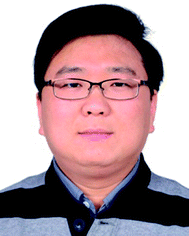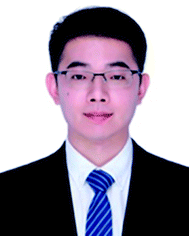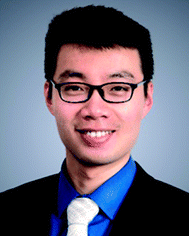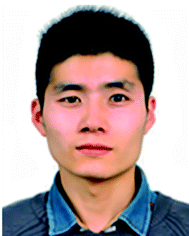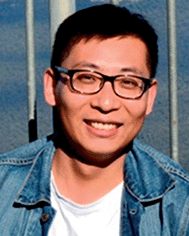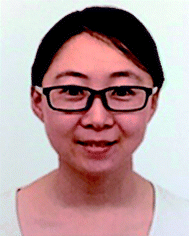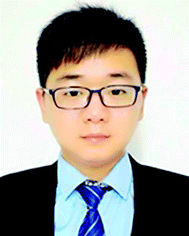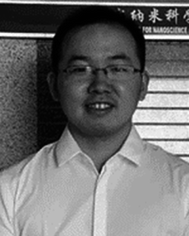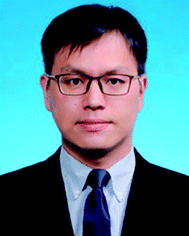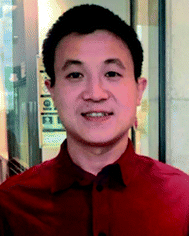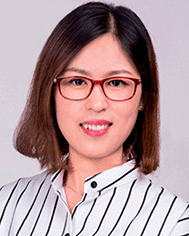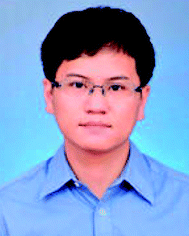DOI:
10.1039/D1TA90184B
(Profile)
J. Mater. Chem. A, 2021,
9, 18681-18700
Contributors to the Emerging Investigators 2021 issue
Abstract
Our 2021 Emerging Investigators themed issue gathers some of the best research being conducted by scientists in the early stages of their independent career. Each contributor was recommended as carrying out work with the potential to influence future directions in materials chemistry. Congratulations to all of the researchers featured, we hope you enjoy reading this issue.
Dr Chibueze Amanchukwu is a Neubauer Family Assistant Professor in the Pritzker School of Molecular Engineering at the University of Chicago, and holds a joint appointment at Argonne National Laboratory. His research involves the design, synthesis, and understanding of ion transport in electrolytes for batteries and electrocatalysis. His team is especially interested in correlating bulk solvation properties to electrochemical interfacial phenomena, and they use data science tools coupled with synthesis and novel characterization approaches to answer these questions. He obtained his PhD in chemical engineering as a NDSEG Fellow at MIT and was a TomKat Center Postdoctoral Fellow at Stanford University.
His contribution to the 2021 Journal of Materials Chemistry A Emerging Investigators collection can be read at DOI: 10.1039/D1TA02754A.
Dr Christoph Baeumer is an assistant professor (Tenure Track) for electrochemistry of nanostructures in the Inorganic Materials Science group at the University of Twente and associate research group leader at Forschungszentrum Jülich. His research group focuses on model electrochemical materials with precisely controlled, single-crystalline surfaces, and their
operando X-ray characterization. He obtained his PhD in solid-state physics at RWTH Aachen University and Forschungszentrum Jülich in 2016, where he worked on
operando spectromicroscopy of brain-inspired computing devices, recognized by the Helmholtz Doctoral Prize and Jülich Excellence Prize. After 1 year as a postdoctoral fellow at Forschungszentrum Jülich, he became a Marie Skłodowska Curie Fellow at Stanford University and RWTH Aachen University (2018–2020).
His contribution to the 2021 Journal of Materials Chemistry A Emerging Investigators collection can be read at DOI: 10.1039/D1TA03205D.
Dr Federico Bella was born in Torino in 1987. He is Associate Professor of Principles of Chemistry for Applied Technologies at Politecnico di Torino. He works in the Electrochemistry Group, leading the research activities on hybrid photovoltaics and post-lithium batteries. He has received the “Environment, Sustainability & Energy Division Early Career Award” from the Royal Society of Chemistry. He is author of 90 publications in international peer-reviewed journals (
h-index 55) and is a member of the editorial board of
Chemical Engineering Journal and
ChemSusChem. Since 2021, he leads the ERC Starting Grant “SuN2rise” on sun-powered electrochemical nitrogen reduction.
His contribution to the 2021 Journal of Materials Chemistry A Emerging Investigators collection can be read at DOI: 10.1039/D1TA03544D.
Dr Megan M. Butala is an assistant professor of materials science and engineering at the University of Florida (UF). Born, raised, and educated in southern California, she received her BS in materials engineering from California Polytechnic State University, San Luis Obispo, and her PhD in materials from the University of California, Santa Barbara, where she worked with Professor Ram Seshadri (2017). She then moved across the country with a National Research Council Postdoctoral Associateship at the National Institute of Standards and Technology in Maryland before beginning in Fall 2019 at UF. Her passions are centred around determining atomic structure evolution to identifying structure–property relationships for energy storage and functional materials, as well as in mentoring an amazing group of budding materials researchers.
Her contribution to the 2021 Journal of Materials Chemistry A Emerging Investigators collection can be read at DOI: 10.1039/D1TA02992D.
Dr Shreyam Chatterjee is an assistant professor in Professor Yutaka Ie’s group at the Institute of Scientific and Industrial Research, Osaka University, Japan. He obtained his PhD under the supervision of Professor Arun K. Nandi from the Indian Association for the Cultivation of Science, Kolkata, India in 2013. After that he worked as a postdoctoral researcher and specially appointed assistant professor with Professor Yoshio Aso (2013–2018) and Professor Yoshito Tobe (2018–2020) at Osaka University. His current research interest is the development of electron deficient π-conjugated molecules for organic electronics and nonfullerene acceptors for cost effective organic solar cells.
His contribution to the 2021 Journal of Materials Chemistry A Emerging Investigators collection can be read at DOI: 10.1039/D1TA03219D.
Dr Jun Chen is currently an assistant professor in the Department of Bioengineering at the University of California, Los Angeles. His research focuses on smart textiles, wearables, and body area networks. With an
h-index of 74, his research has been recognized by the 2020 Altmetric Top 100, Top 10 Science Stories of 2020 by Ontario Science Centre, 30 Rising Leaders in Life Science by Informa, the ACS Nano Rising Stars Lectureship Award, Frontiers in Chemistry Rising Stars, the Nanoscale Emerging Investigator Award, the Okawa Foundation Research Award, and the Highly Cited Researchers 2020/2019 in Web of Science. He is an associate editor of
Biosensors and Bioelectronics.
His contribution to the 2021 Journal of Materials Chemistry A Emerging Investigators collection can be read at DOI: 10.1039/D1TA02518J.
Dr Ye Chen is currently an assistant professor in the Department of Chemistry, at the Chinese University of Hong Kong. She received her BEng and PhD (supervisor: Professor Hua Zhang) in materials science from Nanyang Technological University (Singapore) in 2015 and 2019, respectively. Her current research interest focuses on wet-chemical synthesis of novel inorganic nanomaterials and their applications in catalysis and clean energy.
Her contribution to the 2021 Journal of Materials Chemistry A Emerging Investigators collection can be read at DOI: 10.1039/D1TA03666A.
Dr Yihuang Chen received his BE (2013) and PhD (2017) in materials science and engineering with Professor Guangzhao Zhang from South China University of Technology. From 2017 to 2019 he was a postdoctoral fellow in Professor Zhiqun Lin’s group at the Georgia Institute of Technology. He joined Wenzhou University as a Professor in 2019. His research interests mainly focus on the synthesis of responsive bulk polymers, functional polymer brushes, and polymer/inorganic nanocrystal hybrids for applications in perovskite solar cells, controlled release and photo(electro)catalysis.
His contribution to the 2021 Journal of Materials Chemistry A Emerging Investigators collection can be read at DOI: 10.1039/D1TA03652A.
Dr Xin-Bing Cheng is currently a research assistant professor in the Department of Chemical Engineering at Tsinghua University. He received his BEng from Tianjin University in 2012 and PhD from Tsinghua University in 2017 under the guidance of Professor Qiang Zhang. In 2016, he was a visiting scholar in Professor Yury Gogotsi’s team at Drexel University. His current research interests are mainly focused on energy storage materials and devices, including nanocarbon materials, Li metal batteries, and solid-state batteries. To date, he has published more than 70 papers, 40 of which are highly cited, which have attracted more than 15
![[thin space (1/6-em)]](https://www.rsc.org/images/entities/char_2009.gif)
000 citations with a
h-index of 58.
His contribution to the 2021 Journal of Materials Chemistry A Emerging Investigators collection can be read at DOI: 10.1039/D1TA02615A.
Dr Chang Hyuck Choi received his BS (2007) and PhD (2012) in the Department of Chemical Engineering at the Korea Advanced Institute of Science and Technology (KAIST), Korea. He was a postdoctoral fellow at KAIST from 2012 to 2014. From 2014 to 2016, he worked as a Humboldt research fellow at the Max-Planck-Institut für Eisenforschung (MPIE), Germany. He is currently an associate professor at the School of Materials Science and Engineering at Gwangju Institute of Science and Technology (GIST), Korea. His research interests mainly focus on the fundamental understanding of electrocatalysis for energy conversions.
His contribution to the 2021 Journal of Materials Chemistry A Emerging Investigators collection can be read at DOI: 10.1039/D1TA01748A.
Dr Emiliano Cortés holds a tenure-track professorship in the Faculty of Physics, University of Munich (LMU), Germany. He is the academic lead of the
Plasmonic and Photonic Chemistry group and a visiting researcher at the Chemistry Department, University College London, UK, and at the Physics Department, Imperial College London, UK. His research interests lie at the interface between chemistry and physics, and focus on the development of novel nanomaterials and techniques, specifically for applications in energy conversion. He was recently acknowledged by the European Commission for his project CATALIGHT, and he has co-edited his first book, Plasmonic Catalysis.
His contribution to the 2021 Journal of Materials Chemistry A Emerging Investigators collection can be read at DOI: 10.1039/D1TA04218A.
Dr James A. Dawson is a Newcastle University Academic Track Fellow in the School of Natural and Environmental Sciences. His research utilises state-of-the-art computational techniques to investigate ion transport and interfaces in energy materials. Before joining Newcastle University in 2020, James held postdoctoral positions at the University of Bath (2016–2019) and Cambridge (2015–2016), as well as a prestigious JSPS Postdoctoral Fellowship at Kyoto University (2013–2015). He completed his PhD on perovskite oxides at the University of Sheffield in 2013. James has received several early-career awards and was recently selected as one of three nominees from Newcastle University for the 2022 Blavatnik Awards in the UK.
His contribution to the 2021 Journal of Materials Chemistry A Emerging Investigators collection can be read at DOI: 10.1039/D1TA03680G.
Dr Eric Detsi is the Stephenson Term Chair Assistant Professor in materials science and engineering at the University of Pennsylvania. He received his BSc (2006), MSc (2008), and PhD (2012) degrees in Applied Physics at the University of Groningen in the Netherlands. Before joining Penn, he conducted research at the Department of Chemistry at UCLA (2013–2016) as a Dutch Science Foundation Rubicon Postdoctoral. His current research involves using liquid metals and non-precious nanoporous materials such as nanoporous magnesium, aluminum, silicon, antimony, and tin for electrochemical energy conversion and storage. Dr Detsi is a recipient of the 2021 NSF CAREER award.
His contribution to the 2021 Journal of Materials Chemistry A Emerging Investigators collection can be read at DOI: 10.1039/D1TA04822H.
Dr Jeffrey E. Dick obtained a BS in chemistry from Ball State University in Muncie, Indiana, in 2013 and completed his doctoral work in the laboratory of Allen J. Bard at the University of Texas at Austin in 2017. Jeffrey’s research at the University of North Carolina focuses on how chemistry changes in tiny volumes and how nature takes advantage of such changes for the genesis and propagation of life.
His contribution to the 2021 Journal of Materials Chemistry A Emerging Investigators collection can be read at DOI: 10.1039/D1TA02369A.
Dr Jingjing Duan achieved her Ph.D from School of Chemical Engineering and Advanced Materials at University of Adelaide in 2016. From 2016 to 2019, she worked as a Research Fellow in University of New South Wales, University of Texas at Austin, University of Adelaide, respectively. Then she joined School of Energy and Power Engineering, Nanjing University of Science and Technology as a full Professor until present. Prof. Duan is devoted to developing functional materials for clean energy technologies, including fuel cells, H
2O/N
2/CO
2 electrolysis. She is interested in investigating reaction mechanisms by in situ experimental techniques combined with multiscale simulation. She has received several awards, including Top 2% Scientists Globally (2020), Postgraduate Alumni Medal of University of Adelaide (2017), Women’s Research Excellence (2018)
etc.
Her contribution to the 2021 Journal of Materials Chemistry A Emerging Investigators collection can be read at DOI: 10.1039/D1TA02684D.
Dr Feng Ru Fan is currently an associate professor of chemistry at Xiamen University. He received his BS (2006) and PhD (2013) in physical chemistry from Xiamen University under the joint supervision of Professor Zhongqun Tian and Professor Zhong Lin Wang. He worked as a postdoctoral research associate in Professor Galen Stucky’s group from 2016 to 2019 at the University of California, Santa Barbara, and in Professor Wenzhuo Wu’s group for 2019–2020 at Purdue University. His current research interest focuses on energy harvesting and conversion, triboelectric nanogenerators and self-powered systems, flexible electronics, electrocatalysis, and droplet chemistry.
His contribution to the 2021 Journal of Materials Chemistry A Emerging Investigators collection can be read at DOI: 10.1039/D1TA05332A.
Dr Zhanxi Fan obtained his BS degree in chemistry under the guidance of Professor Bai Yang and Professor Hao Zhang from Jilin University (China) in 2010, and completed his PhD under the supervision of Professor Hua Zhang at Nanyang Technological University (Singapore) in 2015. Then he worked as a research fellow at Nanyang Technological University with Professor Hua Zhang; and at Lawrence Berkeley National Laboratory (USA), with Professor Haimei Zheng. Currently, he is an assistant professor at the Department of Chemistry at the City University of Hong Kong. His research interests mainly include the controlled synthesis, physicochemical properties, and potential applications (
e.g., catalysis and energy conversion) of novel low-dimensional metal and metal-based nanomaterials.
His contribution to the 2021 Journal of Materials Chemistry A Emerging Investigators collection can be read at DOI: 10.1039/D1TA03646G.
Dr Sacha Fop is an honorary research fellow in the School of Natural and Computing Sciences at the University of Aberdeen, and has recently joined the ISIS Neutron and Muon Source as an instrument scientist on a high resolution powder diffractometer (HRPD). Sacha obtained his BSc and MSc in chemistry from the University of Perugia, Italy. He received his PhD from the University of Aberdeen (under the supervision of Professor Abbie Mclaughlin), where he also spent three years as a postdoctoral research fellow. His research focuses on the design and discovery of novel solid-state ionic conductors for energy-related applications, and in the characterisation of their structure–property relationships.
His contribution to the 2021 Journal of Materials Chemistry A Emerging Investigators collection can be read at DOI: 10.1039/D1TA03499E.
Dr Rebecca (Becky) Greenaway is a Royal Society University Research Fellow at the Department of Chemistry at Imperial College London, UK. Becky carried out her PhD at the University of Oxford with Professor Ed Anderson working on developing palladium-catalysed cascade cyclisations, before joining the University of Liverpool as a postdoctoral researcher with Professor Andy Cooper FRS. She began her independent research in 2019 and joined Imperial College London in 2020. Becky’s current research interests include the use of high-throughput automation for the synthesis of molecular organic materials and porous liquids.
Her contribution to the 2021 Journal of Materials Chemistry A Emerging Investigators collection can be read at DOI: 10.1039/D1TA01906F.
After receiving her PhD in chemistry from Tulane University, Dr Jing Gu developed novel semiconductors and semiconductor–catalyst interfaces at Princeton University and the National Renewable Energy Laboratory. Now, as an assistant professor in the Department of Chemistry & Biochemistry at San Diego State University, her current research focuses on designing novel solid-state and hybrid electrocatalysts for fuel generation, along with investigating and tailoring charge transfer mechanisms at the semiconductor–catalyst interface for solar energy conversion purposes.
Her contribution to the 2021 Journal of Materials Chemistry A Emerging Investigators collection can be read at DOI: 10.1039/D1TA02654B.
Dr Cao Guan is a professor and Vice Dean of Frontiers Science Center for Flexible Electronics, Northwestern Polytechnical University. He received his BS degree from the School of Physics, Wuhan University, China, in 2009, and completed his PhD study at the School of Physics and Mathematics Sciences, Nanyang Technological University, Singapore, in 2013. He worked as a research fellow in the Department of Materials Science and Engineering, National University of Singapore from 2014 to 2018. His research focuses on the design of nanostructured materials for flexible energy storage and conversion.
His contribution to the 2021 Journal of Materials Chemistry A Emerging Investigators collection can be read at DOI: 10.1039/D1TA02617H.
Dr Haichuan Guo is currently a postdoctoral researcher at Ningbo Institute of Materials Technology and Engineering (NIMTE), Chinese Academy of Sciences (CAS). He majored in solid-state chemistry during his graduate studies, and is especially interested in perovskite oxides with unusually high-valence Fe ions and their charge disproportionation at low temperature. After he received his PhD from Kyoto University, Japan, he focused on the application of inorganic functional materials. His current research interests are in fundamental solid-state compounds for catalysis, renewable energy, and gas sensors.
His contribution to the 2021 Journal of Materials Chemistry A Emerging Investigators collection can be read at DOI: 10.1039/D1TA02760C.
Dr Ritu Gupta obtained her PhD from the Jawaharlal Nehru Centre for Advanced Scientific Research (JNCASR), Bangalore, in 2013 and carried out postdoctoral research at the Brick Nanotechnology Centre, Purdue University, USA. She is presently working as an associate professor at the Department of Chemistry, Indian Institute of Technology Jodhpur. Her research covers the development of a new generation of functional nanomaterials for flexible devices. Her research group is working on electrochemical energy devices and nanosensors for environmental monitoring. She is also a recipient of the INSA Young Scientist Medal-2020, SERB Women Excellence Award-2021, and has been a member of the Indian National Young Academy of Sciences since January 2021.
Her contribution to the 2021 Journal of Materials Chemistry A Emerging Investigators collection can be read at DOI: 10.1039/D1TA02560K.
Dr Qiyuan He is currently an assistant professor in the Department of Materials Science & Engineering at the City University of Hong Kong. He obtained his PhD from Nanyang Technological University in Singapore in 2013. He then joined the University of California, Los Angeles, as a postdoctoral fellow before returning to Nanyang Technological University as a research fellow in 2016. Dr He’s research scope is highly interdisciplinary, focusing on the fundamentals of semiconductor interfaces and their applications in nanoelectronics, iontronics, chemical/biological sensors, catalysis, on-chip electrochemistry, and of course, Star Wars.
His contribution to the 2021 Journal of Materials Chemistry A Emerging Investigators collection can be read at DOI: 10.1039/D1TA03676A.
Dr Wooyul Kim received his PhD in environmental engineering (advisor: Professor Wonyong Choi) from POSTECH (Pohang, Korea) in 2012, and worked at the Lawrence Berkeley National Laboratory (USA, 2012–2016) as a postdoctoral fellow (advisor: Dr Heinz Frei). During his PhD period, he joined Osaka University (advisor: Professor Tetsuro Majima) as a visiting researcher in 2009, 2010, and 2012. He joined the faculty of the Department of Chemical and Biological Engineering at Sookmyung Women’s University (Seoul, Korea) as an assistant professor (2016) and was promoted to associate professor in 2021. His current research focuses on revealing the structural identity of key intermediates and their roles in the catalytic cycle (
i.e., their kinetic relevancy) to overcome the kinetic barriers for photo (or electro) catalysis. At this early stage of his independent career within the field of photo(electro)catalysis for energy and environmental applications, he is honored to be a winner of the 2020 Energy & Environmental Science lectureship award (Royal Chemistry of Society).
His contribution to the 2021 Journal of Materials Chemistry A Emerging Investigators collection can be read at DOI: 10.1039/D1TA02644E.
Dr Changli Li is an associate professor at the School of Materials, Sun Yat-sen University, China. He received his PhD in mechanical engineering from the University of Tokyo, Japan, in 2015. After postdoctoral studies at Tsinghua University and the University of British Columbia, he began his independent career as a faculty member at Sun Yat-sen University. His research activities focus on the synthesis of nanostructured materials and semiconductor heterojunctions for electrochemical and photoelectrochemical energy conversion.
His contribution to the 2021 Journal of Materials Chemistry A Emerging Investigators collection can be read at DOI: 10.1039/D1TA03624F.
Dr Christina Li received an AB in chemical and physical biology from Harvard University in 2009, working with Professor David Evans. She completed her PhD in chemistry at Stanford University in 2015, working with Professor Matthew Kanan on nanostructured Cu electrodes for CO
2 reduction. She then did postdoctoral work at UC Berkeley with Professor Paul Alivisatos on colloidal semiconductor nanocrystals. Since 2016, she has been an assistant professor in the chemistry department at Purdue University where her group focuses on colloidal synthetic strategies to tune the electronic properties and ensemble geometry of nanomaterial active sites for electrochemical and thermal catalytic reactions.
Her contribution to the 2021 Journal of Materials Chemistry A Emerging Investigators collection can be read at DOI: 10.1039/D1TA02468J.
Dr Fengwang Li is a lecturer and DECRA Fellow with the School of Chemical and Biomolecular Engineering at the University of Sydney (USYD). His research aims for a “greener”, carbon-neutral future relying on electrochemical energy. Dr Li completed his bachelor’s and master’s degrees in chemistry at Renmin University of China and gained his PhD in chemistry from Monash University in 2017. Before joining USYD, Dr Li completed his postdoctoral research at the University of Toronto, where he focused on developing catalysts and systems for the conversion of carbon dioxide to fuels and chemicals.
His contribution to the 2021 Journal of Materials Chemistry A Emerging Investigators collection can be read at DOI: 10.1039/D1TA02751D.
Dr Linsen Li is now an associate professor of chemical engineering at Shanghai Jiao Tong University. He obtained his PhD from the University of Wisconsin-Madison in 2015 and worked as a postdoc at Massachusetts Institute of Technology in 2015–2017. His research efforts are focused on battery cathode materials, mesocale battery science, and advanced characterization techniques. He has won the Materials Research Society Gold Award for Graduate Students in 2014, and the Royal Society Newton International Fellowship in 2016 (declined the award).
His contribution to the 2021 Journal of Materials Chemistry A Emerging Investigators collection can be read at DOI: 10.1039/D1TA02351A.
Dr Mengran Li obtained his PhD at the University of Queensland, Australia, in 2016, and started his postdoc position at the HBIS-UQ Innovation Centre for Sustainable Steel at UQ on the development of viable CO
2 electrolysis technology for steel mills. His research in the field of CO
2 electrochemical reduction includes material development and experiment testing, with the goal of understanding electrode interfacial interactions, and developing industrially relevant electrochemical processes
via material innovation and engineering. He recently joined TU Delft to continue his research and passion in materials science and technology development to improve the sustainability of energy generation and chemical manufacturing.
His contribution to the 2021 Journal of Materials Chemistry A Emerging Investigators collection can be read at DOI: 10.1039/D1TA03636J.
Dr Rengui Li received his PhD from the Dalian Institute of Chemical Physics (DICP), Chinese Academy of Sciences (CAS) in 2014. He worked as the visiting research associate in Professor Kazunari Domen’s group at the University of Tokyo (2011) and Professor Harry Atwater’s group at the California Institute of Technology (2019–2020). He began his career at DICP as an associate professor in 2014 and was promoted as a full professor in 2018. His research interest is mainly focused on photocatalytic solar energy conversion, and currently he is the group leader of micro/nano photo(electro)catalyst and photocatalysis research group. He has published more than 50 scientific papers with more than 4000 citations.
His contribution to the 2021 Journal of Materials Chemistry A Emerging Investigators collection can be read at DOI: 10.1039/D1TA02504J.
Dr Weifeng Li received his BS (2005) and MS (2008) in condensed matter physics from Shandong University. He then came to Singapore, where he completed his PhD (2012) in biological physics at the Nanyang Technological University (NTU). He then moved to A*STAR and spent two years as a research scientist at the Institute of High Performance Computing, where he learned multi-scale modeling. Then, he spent three years at the Medical School of Soochow University as an associate professor from 2015 to 2017 studying the cytotoxicity of nanomaterials using computational and experimental approaches. In 2018, he joined the Shandong University as a full professor, working in the School of Physics. He currently leads a group with research interests in theoretical modeling of nanomaterial catalysis, and nano-biomolecular interactions. Dr Li has published more than 70 peer-reviewed papers in well recognized journals and delivered 20+ invited talks worldwide.
His contribution to the 2021 Journal of Materials Chemistry A Emerging Investigators collection can be read at DOI: 10.1039/D1TA02691G.
Dr Yaozu Liao is a full professor and deputy director at the College of Materials Science and Engineering, Donghua University. He received his PhD in 2011 from Tongji University. Before that, he was a visiting scholar at the University of California, Los Angeles (2008–2010). After working at the University of Shanghai for Science and Technology as a lecturer for two years (2011–2013), he carried out his postdoctoral research at the University of Bristol (2013–2015) and the Technical University of Berlin (2016–2018). His research interests focus on the design and synthesis of porous conjugated polymers for energy storage and conversion, chemical sensing, adsorption, and separation applications.
His contribution to the 2021 Journal of Materials Chemistry A Emerging Investigators collection can be read at DOI: 10.1039/D1TA02547C.
Dr Mingkai Liu is currently an associate professor at the School of Chemistry and Materials Science at Jiangsu Normal University. He received his PhD from Fudan University in 2014. He worked as a postdoctoral fellow at the Georgia Institute of Technology from 2018 to 2020. His research focuses on the rational design and synthesis of nanomaterials for applications in energy storage and catalytic processes.
His contribution to the 2021 Journal of Materials Chemistry A Emerging Investigators collection can be read at DOI: 10.1039/D1TA02769G.
Dr Yaqing Liu received his BS degree in 2008 from Shandong University, and PhD from the Institute of Chemistry, Chinese Academy of Sciences, in 2013 under the supervision of Professor Minghua Liu. After serving as a postdoctoral fellow at Nanyang Technological University, Singapore, in Professor Xiaodong Chen’s lab from 2014–2018, he joined Shandong University as a professor. In July 2019, he established his research group that mainly focuses on supramolecular materials, functional hydrogels, and flexible electronics.
His contribution to the 2021 Journal of Materials Chemistry A Emerging Investigators collection can be read at DOI: 10.1039/D1TA02791C.
Dr Yijin Liu is a lead scientist at the Stanford Synchrotron Radiation Lightsource, SLAC National Accelerator Laboratory. He received his BS and PhD in optics from the University of Science and Technology of China, in 2004 and 2009, respectively. With extensive experience in X-ray spectroscopy, microscopy, and the associated big data mining methods, his group is active in the research of energy materials using synchrotrons and free-electron-lasers. In his personal life, Liu is interested in photography. He often says that you do not need expensive camera gear to take a good photo. Still, when he takes X-ray photos, he often chooses to use large-scale X-ray facilities that cost roughly a billion dollars each.
His contribution to the 2021 Journal of Materials Chemistry A Emerging Investigators collection can be read at DOI: 10.1039/D1TA02262H.
Dr Benedict Tsz Woon Lo is a solid-state chemist who has interest in the fundamental aspects of microporous materials and their catalytic applications. He developed a reliable methodology using state-of-the-art synchrotron X-ray techniques to reveal molecular behaviour, based upon scattering and spectroscopic evidence, for the subsequent design of novel catalytic systems. He obtained his MChem and DPhil degrees from St. John’s College, the University of Oxford (UK). Since 2017, he has been a research assistant professor at Hong Kong Polytechnic University.
His contribution to the 2021 Journal of Materials Chemistry A Emerging Investigators collection can be read at DOI: 10.1039/D1TA02723A.
Dr Zaizhu Lou is a professor of materials science and optical engineering at Jinan University. He obtained his PhD in materials science under the guidance of Dr Baibiao Huang at Shandong University in 2014. After working under Japan Society for the Promotion of Science (JSPS) Supported Research with Tetsuro Majima at Osaka University, he joined Jinan University in 2017. His research interests are in the field of metals or semiconductors with surface plasmon resonance for hot carrier generation, transfer and recombination, and their application for photocatalytic hydrogen generation and CO
2 reduction. He has received funding under the Distinguished Young Scholars and Young Pearl River Scholar from the Government of Guangdong Province.
His contribution to the 2021 Journal of Materials Chemistry A Emerging Investigators collection can be read at DOI: 10.1039/D1TA04541E.
Dr Chao Luo received his Bachelor’s degree from Wuhan University in 2008. Then, he entered the Technical Institute of Chemistry and Physics, Chinese Academy of Sciences and received his Master’s degree in 2011. After that, he obtained his PhD at the University of Maryland, College Park, in 2015 and continued working as a postdoc there from 2016 to 2019. Dr Luo is currently an assistant professor at George Mason University. His research interests focus on developing new materials and new chemistries for high-performance and sustainable energy storage devices.
His contribution to the 2021 Journal of Materials Chemistry A Emerging Investigators collection can be read at DOI: 10.1039/D1TA00528F.
Dr Hongjin Lv is a professor of inorganic chemistry at the Beijing Institute of Technology. He started a loving relationship with polyoxometalates (POMs) during his PhD studies with Professor Craig L. Hill at Emory University, then he finished his postdoctoral research training with Professor Richard Eisenberg at the University of Rochester. His current research is focused on designing structurally-new POMs and constructing POM-based functional materials for solar energy conversion/storage, value-added transformations of organic chemicals, and environmental remediation.
His contribution to the 2021 Journal of Materials Chemistry A Emerging Investigators collection can be read at DOI: 10.1039/D1TA02792A.
Dr Zaifei Ma obtained her PhD from Linköping University in Sweden (2013), under the supervision of Professor Fengling Zhang. Then she stayed as a postdoc in Linköping until 2015, studying the charge-transfer state and voltage losses in organic solar cells. In 2016, she was awarded a Humboldt research fellowship, and moved to the group led by Professor Koen Vandewal in TU Dresden. She has been a professor at the Center of Advanced Low-dimension Materials at Donghua University since January 2018. Her current research interests include device engineering and device physics of organic solar cells.
Her contribution to the 2021 Journal of Materials Chemistry A Emerging Investigators collection can be read at DOI: 10.1039/D1TA00576F.
Dr G. N. Manjunatha Reddy is an assistant professor of chemistry at the University of Lille, France. He received his PhD from Aix-Marseille University, France. Subsequently he has been a postdoctoral researcher at the University of Warwick (UK), and research associate at the University of California Santa Barbara (USA). In 2016, he became a Royal Society of Chemistry Member. He received the Marie Skłodowska-Curie Individual Fellowship Award in 2017 on behalf of the European Union Framework Programme Horizon-2020. His research is focused on establishing structure–property relationships in energy materials and self-assembled nanomaterials using solid-state NMR spectroscopy and modelling approaches.
His contribution to the 2021 Journal of Materials Chemistry A Emerging Investigators collection can be read at DOI: 10.1039/D1TA03572J.
Dr Mirco Natali is an associate professor of general and inorganic chemistry at the Department of Chemical, Pharmaceutical, and Agricultural Sciences (DOCPAS) at the University of Ferrara (Italy). He has worked at the same institution since 2010 in the group of Professor Franco Scandola both as a PhD and as a postdoc before starting his independent career. In 2013 he was a visiting student at the “Institut de Science et d’Ingénierie Supramoléculaires” (University of Strasbourg) in the group of Professor Luisa De Cola. His research interests include several aspects of artificial photosynthesis as well as the fundamental understanding of photoinduced energy and electron transfer processes.
His contribution to the 2021 Journal of Materials Chemistry A Emerging Investigators collection can be read at DOI: 10.1039/D1TA03645A.
Dr Florentina Neaţu received her BS and MS degrees in catalysis and catalytic processes, and in 2010 her PhD, in chemistry, at the University of Bucharest, Faculty of Chemistry. In 2008, she became an assistant professor in the Department of Catalytic Processes and Catalysis, at the Faculty of Chemistry, University of Bucharest, and in 2017 she moved to the National Institute of Materials Physics, Romania. Currently, she is scientist researcher I in the Catalytic Material and Catalysis group, and her contributions to the scientific community have focused mainly on the field of materials chemistry and, in particular, in materials for heterogeneous catalysis.
Her contribution to the 2021 Journal of Materials Chemistry A Emerging Investigators collection can be read at DOI: 10.1039/D1TA04097A.
Dr Kenji Okada received his PhD (engineering) in materials science from Osaka Prefecture University in 2014. After receiving his degree, he worked as a JSPS (Japan Society for the Promotion of Science) postdoctoral researcher from 2014 to 2015. From 2015 to 2017, he was appointed as an assistant professor at Osaka University. He moved to Osaka Prefecture University as an assistant professor in 2017 and was promoted to associate professor in 2020. He was chosen as a ‘Leading Initiative for Excellent Young Researchers (LEADER)’ by MEXT in 2017. He has also worked as a PRESTO researcher of JST since 2019. His research interest is to fabricate nanomaterials (
e.g., 1D metal hydroxide, metal organic frameworks, mesoporous silica) with macroscopically controlled orientation and aggregation for electrical, optical and thermal applications.
His contribution to the 2021 Journal of Materials Chemistry A Emerging Investigators collection can be read at DOI: 10.1039/D1TA02968A.
Dr Freddy E. Oropeza is a Marie Skłodowska-Curie fellow at IMDEA Energy. His research interests focus on the understanding and control of structural and electronic properties that define the functionality of metal oxide thin films and interfaces for applications in electronics and (photo)electrochemical technologies. He obtained his PhD in chemistry from the University of Oxford in 2012, followed by work as a postdoctoral researcher at the Ruhr University Bochum (2012–2013), Imperial College London (2013–2016) and the Eindhoven University of Technology (2016–2019).
His contribution to the 2021 Journal of Materials Chemistry A Emerging Investigators collection can be read at DOI: 10.1039/D1TA03732C.
Dr Jungwon Park received his BS degree from the Department of Chemistry, POSTECH, South Korea, in 2003, and his PhD from the Department of Chemistry, University of California, Berkeley, in 2012. After a postdoc with the School of Engineering and Applied Sciences, Harvard University, he started a faculty position with the School of Chemical and Biological Engineering, Seoul National University, in 2016, and he currently serves as an associate professor jointly affiliated with the Center for Nanoparticle Research, Institute for Basic Science (IBS). His research area includes the
in situ study of catalytic and energy nanomaterials, liquid-phase TEM, phase transitions, heterogeneous catalysis, and low-dimensional materials.
His contribution to the 2021 Journal of Materials Chemistry A Emerging Investigators collection can be read at DOI: 10.1039/D1TA00468A.
Dr Zengxia Pei received his PhD from the City University of Hong Kong in 2017. He currently works as an Australian Research Council Discovery Early Career Researcher Award (ARC DECRA) Fellow at the University of Sydney. His research focuses on the design and development of nanomaterials for sustainable energy conversion and storage in fields including electrocatalysis, aqueous batteries/capacitors, and functional polyelectrolytes. He was recognized as one of the Australian Research Top 40 Rising Stars, and as a Clarivate Analytics Highly Cited Researcher in 2020.
His contribution to the 2021 Journal of Materials Chemistry A Emerging Investigators collection can be read at DOI: 10.1039/D1TA02775A.
Dr Fengdong Qu received his BA (2012), MA (2015) and PhD (2020) from Jilin University, China. Subsequently, he has been working as a postdoctoral researcher in Professor Minghui Yang’s group. He currently focuses on designing novel functional materials as well as high-performance gas sensors, and exploring their applications in environmental monitoring and disease diagnosis.
His contribution to the 2021 Journal of Materials Chemistry A Emerging Investigators collection can be read at DOI: 10.1039/D1TA02433G.
Dr Jingrun Ran received his BE and ME degrees in materials science and engineering from the Wuhan University of Technology, and PhD in chemical engineering from the University of Adelaide. Now he is working as an ARC DECRA Fellow in Professor Shizhang Qiao’s group, focusing on the atomic-level design and synthesis of photocatalysts for producing energy fuels and value-added chemicals using renewable solar energy. Dr Ran received the Clarivate Highly Cited Researcher award in 2020.
His contribution to the 2021 Journal of Materials Chemistry A Emerging Investigators collection can be read at DOI: 10.1039/D0TA11201A.
Dr Felix H. Richter is a junior research group leader in physical chemistry, materials science and characterization at the Center for Materials Research of the Justus-Liebig-University Gießen. He is particularly interested in concepts that bridge the properties of inorganic materials and polymers. Currently, the Richter workgroup specializes in analyzing the fundamental transport mechanisms of ions across the interfaces of different battery components and the development of hybrid approaches for solid-state batteries. In March 2020, he received NanoMatFutur funding from the Federal Ministry for Education and Research on the topic of Solid-State Batteries with Lithium Metal and Polymer Protective Coatings.
His contribution to the 2021 Journal of Materials Chemistry A Emerging Investigators collection can be read at DOI: 10.1039/D1TA02796D.
Dr Tomče Runčevski was born in Macedonia where he finished his undergraduate studies in 2011. He did his PhD at the Max Planck Institute for Solid State Research in Germany, with Professor Robert E. Dinnebier. His graduate work was on structural characterization of materials with diffraction methods, with a focus on structures of polycrystalline materials. He graduated in 2014 with honors, and he was awarded the Otto Hahn Medal. In 2015, he joined UC Berkeley as a postdoc with Professor Jeffrey R. Long, working on characterization of porous materials. In 2018, he started his independent career at the SMU, as an assistant professor of chemistry.
His contribution to the 2021 Journal of Materials Chemistry A Emerging Investigators collection can be read at DOI: 10.1039/D0TA10613E.
Dr Ieuan Seymour received his MEng in materials science and engineering from Imperial College London in 2012. He completed his PhD in 2017 at the University of Cambridge in the group of Professor Clare Grey, FRS. His PhD work focused on the combined use of nuclear magnetic resonance and first principles calculations to understand the local structure of battery materials. In 2018 he started a postdoctoral position in the group of Professor Graeme Henkelman at UT Austin. Since 2020 he has been a postdoctoral research associate in the electroceramics group in the Materials Department at Imperial College London. His current interests are on the development of computational and experimental techniques to study interfacial phenomena in batteries.
His contribution to the 2021 Journal of Materials Chemistry A Emerging Investigators collection can be read at DOI: 10.1039/D1TA03254B.
Dr Jizhong Song is a professor at the School of Physics and Engineering, Zhengzhou, China. He received his Master’s degree in materials science and engineering from Shanghai University in 2011, and PhD in materials science from Nanjing University of Aeronautics and Astronautics in 2015. His current research focuses on: (i) the controlled synthesis of highly luminescent semiconductor nanocrystals; (ii) quantum dot surface chemistry; (iii) exploration of novel synthesis for nanomaterials; (iv) novel semiconductors for light-emitting diodes and photodetectors; (v) novel materials and concepts for optoelectronic devices. He has published around 80 peer-reviewed articles with over 10
![[thin space (1/6-em)]](https://www.rsc.org/images/entities/char_2009.gif)
000 citations.
His contribution to the 2021 Journal of Materials Chemistry A Emerging Investigators collection can be read at DOI: 10.1039/D1TA02786G.
Dr Reiner Sebastian Sprick obtained his PhD in chemistry from the University of Manchester working on metal-catalysts for the synthesis of conjugated polymers. He then joined the University of Liverpool first as a postdoctoral research associate, then working as a research lead in the area of photocatalysis. In 2020 he moved to the University of Strathclyde to begin his career as an independent researcher. His research group has major research interests across a wide spectrum of polymer chemistry with a particular interest addressing challenges in sustainability.
His contribution to the 2021 Journal of Materials Chemistry A Emerging Investigators collection can be read at DOI: 10.1039/D1TA03098A.
Dr Xiao Su is an assistant professor in chemical and biomolecular engineering at the University of Illinois, Urbana-Champaign. He obtained his Bachelor in Applied Science in chemical engineering from the University of Waterloo in 2011, and PhD in chemical engineering from MIT in 2017. During his doctoral studies, Xiao received the MIT Water Innovation Prize and the MassCEC Catalyst Award for his work on electrochemically-mediated water purification. Since joining Illinois, Xiao has been the recipient of the NSF CAREER Award (2019), the ACS Viktor K. Lamer Award (2020), and the ISE-Elsevier Prize for Green Electrochemistry (2021). His research focuses on the development of functional materials for advanced separation and process intensification. In his free time, Xiao loves watching and playing soccer (in the US)/football (anywhere else).
His contribution to the 2021 Journal of Materials Chemistry A Emerging Investigators collection can be read at DOI: 10.1039/D1TA03334D.
Dr Afriyanti Sumboja received her BEng and PhD in materials science and engineering from Nanyang Technological University (NTU), Singapore, in 2009 and 2014, respectively. She was the recipient of the 2014 MSE Doctorate Research Excellence Award, presented by the School of Materials Science and Engineering, NTU. After a short postdoctoral research stay in NTU, she joined the Institute of Materials Research and Engineering of A*STAR Singapore as a Scientist. In 2018, she decided to contribute to higher education in Indonesia by joining the Institut Teknologi Bandung as an assistant professor. Her research mostly focuses on materials for electrochemical-based applications, especially for energy storage devices and electrocatalysis.
Her contribution to the 2021 Journal of Materials Chemistry A Emerging Investigators collection can be read at DOI: 10.1039/D1TA02711E.
Dr Chaoliang Tan is currently an assistant professor in the Department of Electrical Engineering at the City University of Hong Kong. He received his BE and ME from Hunan University of Science and Technology and the South China Normal University in 2009 and 2012, respectively. He received his PhD from Nanyang Technological University in 2016. After working as a research fellow in the same group for about a year, he worked as a postdoc at the University of California, Berkeley for two years. His research focuses on 2D materials for electronics/optoelectronics and engineering of layered materials for biomedicine, energy storage,
etc.
His contribution to the 2021 Journal of Materials Chemistry A Emerging Investigators collection can be read at DOI: 10.1039/D1TA02493K.
Dr Jianbo Tang received his PhD in 2016 from the University of the Chinese Academy of Sciences with thesis work completed at the Technical Institute of Physics and Chemistry, Chinese Academy of Sciences. He conducted his postdoctoral research at Tsinghua University from 2016 to 2018, and at the University of New South Wales (UNSW) thereafter. Dr Tang’s research interest encompass a broad spectrum of fundamental and applied sciences of low-melting-point metals and alloys, known as liquid metals. Currently, his research is in alloys surface-/interface-related mass transport phenomena, phase transition dynamics, and chemical/electrochemical reactions of liquid metals for materials synthesis and their nanotechnology-based applications.
His contribution to the 2021 Journal of Materials Chemistry A Emerging Investigators collection can be read at DOI: 10.1039/D1TA02664J.
Dr Tao Song is an associate professor at the Institute of Functional Nano & Soft Materials, Soochow University, China. He received his PhD from Soochow University in 2012. Then, he joined Soochow University in 2013. His current research focuses on printed electronic devices for next-generation optoelectronic devices, such as LED, PV and TFT devices based on perovskite, organic and quantum dot materials.
His contribution to the 2021 Journal of Materials Chemistry A Emerging Investigators collection can be read at DOI: 10.1039/D1TA03647E.
Dr Blaise Tardy is currently a research fellow at Aalto University. After his studies at the Swiss Federal Institute of Science and Technology (EPFL, Switzerland, 2009) in bioengineering, he obtained his PhD in chemical and biomolecular engineering from the University of Melbourne (Australia, 2015). His research is dedicated to the formation of sustainable materials from natural biopolymers and bio-based particles as inspired from macromolecular and bio-colloidal interactions observed in biological structures. His current focus lies on the interfacial development of supramolecular interactions during consolidation of bio-based materials, with the intent to provide both fundamental insights and engineering parameters for the growing bio-based industries.
His contribution to the 2021 Journal of Materials Chemistry A Emerging Investigators collection can be read at DOI: 10.1039/D1TA03215A.
Dr Miriam M. Unterlass is a chemist, materials scientist and chemical engineer by training. She is a professor of materials chemistry at Technische Universität Wien, Austria. Together with her wonderful team of currently 15 co-workers, Miriam works on the development of maximally efficient and sustainable syntheses of advanced organic and hybrid materials. Recently, she founded her first company, UGP materials, which aims at bringing hydrothermal organic materials synthesis to the market.
Her contribution to the 2021 Journal of Materials Chemistry A Emerging Investigators collection can be read at DOI: 10.1039/D1TA01253C.
Dr An-Liang Wang obtained his PhD at Sun Yat-sen University in 2016. He then worked as a postdoc at Nanyang Technological University (2016–2018). From 2018 onwards, he has been a full professor at the School of Chemistry and Chemical Engineering, Shandong University. His research interests mainly focus on the design and synthesis of novel nanomaterials and their application in water splitting, fuel cell, electrochemical reduction of nitrogen and nitrate for ammonia synthesis.
His contribution to the 2021 Journal of Materials Chemistry A Emerging Investigators collection can be read at DOI: 10.1039/D1TA02783B.
Dr Bing Wang is an associate professor in the School of Physics at Nanjing University in Nanjing, China. She received her PhD from Nanjing University in 2014. She was subsequently an assistant professor at Nanjing University (China) and postdoctoral research associate at Georgia Institute of Technology (USA). Her work has been focusing on the synthesis of novel and functional nanostructured materials, including semiconductors, high-entropy nanoparticles and metallic nanocrystals, for exploring their potential use in electrocatalysis, photocatalysis, photoelectrochemistry or solar cells.
Her contribution to the 2021 Journal of Materials Chemistry A Emerging Investigators collection can be read at DOI: 10.1039/D1TA02718B.
Dr Feng Wang received his BS degree in applied chemistry from Huazhong University of Science and Technology in 2005 and his PhD from the Technical Institute of Physics and Chemistry, the Chinese Academy of Sciences, under the supervision of Professor Li-Zhu Wu and Professor Chen-Ho Tung in 2013. After postdoctoral research (2013–2016) at the University of Hong Kong, working with Professor Chi-Ming Che, he joined the faculty of Huazhong University of Science and Technology as an associate professor. His research interests include artificial photosynthesis, self-assembly of optical-functional materials, and supramolecular photoluminescence.
His contribution to the 2021 Journal of Materials Chemistry A Emerging Investigators collection can be read at DOI: 10.1039/D1TA02673A.
Dr Jun Wang received his PhD from the Institute for Superconducting and Electronic Materials, University of Wollongong in 2016. He then did postdoctoral research at the School of Materials Science and Engineering, and the School of Chemistry and Chemical Engineering at Shandong University. He is currently an assistant professor in the School of Materials Science and Engineering at Shandong University. His recent scientific interests are devoted to novel nanomaterials for electrochemical catalysis and rechargeable batteries. He has published over 40 peer-reviewed papers in journals including
Advanced Materials,
Advanced Energy Materials, and
Journal of Materials Chemistry A.
His contribution to the 2021 Journal of Materials Chemistry A Emerging Investigators collection can be read at DOI: 10.1039/D1TA03584C.
Dr Shuhua Wang is a professor at the State Key Laboratory of Crystal Materials, Shandong University. She received her PhD in 2016 from the Beijing Institute of Nanoenergy and Nanosystems, Chinese Academy of Sciences. Her current research is mainly focused on rechargeable batteries, nanogenerators, and the application of nanomaterials in regulating the fate of stem cells and/or immune cells.
Her contribution to the 2021 Journal of Materials Chemistry A Emerging Investigators collection can be read at DOI: 10.1039/D1TA03620C.
Dr Xiaoguang Wang is an assistant professor of chemical and biomolecular Engineering at OSU. Prior to starting at OSU in January 2019, he was a postdoctoral researcher in the School of Engineering and Applied Sciences at Harvard University. He completed his BS and MS degrees in the Department of Chemical Engineering at Zhejiang University, and a PhD in the Department of Chemical and Biological Engineering at the University of Wisconsin-Madison. Dr Wang’s research group focuses on the design of novel materials
via engineering of defects in both hard and soft materials.
His contribution to the 2021 Journal of Materials Chemistry A Emerging Investigators collection can be read at DOI: 10.1039/D1TA02785A.
Dr Yuxian Wang received his BEng with first-class honors and PhD from Curtin University in 2013 and 2016, respectively. He then joined the College of Chemical and Environmental Engineering, China University of Petroleum-Beijing, as an associate professor. His current research interests include seeking feasible applications of nanomaterial-based advanced oxidation processes (AOPs) in environmental remediation and facilitating mechanistic insights into carbocatalysis with advanced protocols.
His contribution to the 2021 Journal of Materials Chemistry A Emerging Investigators collection can be read at DOI: 10.1039/D1TA02953C.
Dr Bo Weng received his PhD from Fuzhou University in 2018. He is currently a junior research fellow at KU Leuven under funding from Marie Skłodowska-Curie (MSCA) Individual Fellowship (Horizon 2020) and Research Foundation-Flanders (FWO). His research focuses on the design of stable and efficient Au clusters- and perovskite-based composite photocatalysts toward solar energy conversion, including H
2 generation, CO
2 reduction and selective organic conversion.
His contribution to the 2021 Journal of Materials Chemistry A Emerging Investigators collection can be read at DOI: 10.1039/D1TA03573H.
Dr Jingjie Wu is an assistant professor in chemical engineering at the University of Cincinnati. He received BS and MS both in materials science and engineering from Wuhan University of Technology in 2006 and 2009, respectively. He received his PhD in chemical engineering from the University of South Carolina in 2014. After completing a PhD, he did postdoctoral research with Professor Pulickel M. Ajayan at Rice University in 2014–2017. He received the ORAU Ralph E. Powe Junior Enhancement award in 2018 and CEAS Distinguished Researcher Award in 2021. His research interests focus on heterogeneous catalysis for C1 molecule transformation coupled with electrical/solar/magnetic/thermal energies.
His contribution to the 2021 Journal of Materials Chemistry A Emerging Investigators collection can be read at DOI: 10.1039/D1TA02565A.
Dr Menghao Wu received his BS degree from Nanjing University, China, in 2007 and his PhD from the University of Nebraska-Lincoln, USA, in 2011. In 2012/01, he joined Virginia Commonwealth University, USA, as a postdoctoral fellow. In 2013/09, he joined Massachusetts Institute of Technology, USA, as a postdoctoral fellow. Since 2014/12 he has been a professor in the School of Physics, Huazhong University of Science and Technology, China. His current research is focused on low-dimensional ferroelectrics/multiferroics, and a series of his predictions have been experimentally confirmed, including the proposal of sliding ferroelectricity and Moire ferroelectricity. He has published over 50 peer-reviewed papers in
Nat. Commun.,
Natl. Sci. Rev.,
JACS,
Nano Lett.,
etc.
His contribution to the 2021 Journal of Materials Chemistry A Emerging Investigators collection can be read at DOI: 10.1039/D1TA02645C.
Dr Zhonghua Xiang is a professor in the College of Chemical Engineering at the Beijing University of Chemical Technology (BUCT). He received his PhD in 2013 at BUCT and was a postdoctoral researcher at Case Western Reserve University (2013–2014). His current scientific interests are focused on the design and synthesis of covalent organic polymers and their related hybrids for clean energy storage and conversion,
e.g., fuel cells, photocatalysis and flow batteries.
His contribution to the 2021 Journal of Materials Chemistry A Emerging Investigators collection can be read at DOI: 10.1039/D1TA02193A.
Dr Chengfen Xing is a professor at Hebei University of Technology, China. She received her BS degree from Shandong Normal University in 2005. She obtained her PhD from the Institute of Chemistry, Chinese Academy of Sciences (ICCAS) in 2011 under the supervision of Professor Shu Wang. After working as a postdoctoral researcher at the MESA+ Institute of Nanotechnology, University of Twente, and the Institute of Molecules and Materials, University of Nijmegen, from 2011 to 2013, she began her independent faculty career as a professor of chemistry at Hebei University of Technology. Research interests include the design and synthesis of conjugated polymer-based hybrid materials for antibacterial and biological function regulation.
Her contribution to the 2021 Journal of Materials Chemistry A Emerging Investigators collection can be read at DOI: 10.1039/D1TA01019K.
Dr Xuzhou Yan was born in China in 1986. He obtained his PhD from Professor Feihe Huang’s group at Zhejiang University in 2014. Then he joined Professor Peter J. Stang’s group as a postdoctoral fellow at the University of Utah. In August 2016, he moved to Stanford University to continue his postdoctoral research until August 2018, under the supervision of Professor Zhenan Bao. In September 2018, he started his independent career as a full professor at Shanghai Jiao Tong University with research interests in mechanically adaptive supramolecular polymeric materials and mechanically interlocked polymers.
His contribution to the 2021 Journal of Materials Chemistry A Emerging Investigators collection can be read at DOI: 10.1039/D1TA02288A.
Dr Yan Yan is an associate professor in the School of Chemistry and Materials Science at Jiangsu Normal University. She earned her BS degree in materials chemistry at Henan University, and later received her PhD in inorganic chemistry from Sun Yat-Sen University in 2014. She studied at Georgia Institute of Technology as a visiting scholar from 2019–2020. Her research interests focus on nanocarbon materials, advanced energy storage/conversion, lithium–sulfur batteries, and catalysis.
Her contribution to the 2021 Journal of Materials Chemistry A Emerging Investigators collection can be read at DOI: 10.1039/D1TA02741G.
Dr Nailiang Yang received his BS degree at Sun Yat-sen University, and then obtained his doctorate degree from the University of Chinese Academy of Sciences in 2013 under the supervision of Professor Dan Wang. His thesis has been awarded the CAS Excellent Doctoral Dissertations. After graduation, he joined Professor Marie-Paule Pileni’s group at the Université Pierre et Marie Curie. Since 2015, he has been working in Professor Hua Zhang’s group of Nanyang Technological University. His research interests include synthesis and property research on 2D nanomaterials. Since 2018, he has been working in the Institute of Process Engineering, CAS as a full professor.
His contribution to the 2021 Journal of Materials Chemistry A Emerging Investigators collection can be read at DOI: 10.1039/D1TA03634C.
Dr Ya Yang’s main research interests focus on nanoenergy materials and devices for energy scavenging, self-powered sensing, and some new physical effects. He has published a book and more than 190 SCI academic papers in
Science Advances and other journals. These papers have been cited more than 12
![[thin space (1/6-em)]](https://www.rsc.org/images/entities/char_2009.gif)
000 times, and his
h-index is 66. His research results have been reported in highlights by various famous international academic media, such as
the Guardian and so on. He is the editor-in-chief of
Nanoenergy Advances, and an editorial committee member of
Nano-Micro Letters and other journals.
His contribution to the 2021 Journal of Materials Chemistry A Emerging Investigators collection can be read at DOI: 10.1039/D1TA02287C.
Dr Long Ye has been a full professor at the School of Materials Science & Engineering of Tianjin University since October 2019. He received his PhD from ICCAS (adviser: Professor Jianhui Hou) in 2015. From 2015 to 2019, he was a postdoctoral researcher and was later promoted to research assistant professor in the same group headed by Professor Harald Ade at the Department of Physics, North Carolina State University. His current interests include morphological and mechanical characterization of semiconducting polymers and their blends in solar cells and transistors, and polymer physics of conjugated polymers.
His contribution to the 2021 Journal of Materials Chemistry A Emerging Investigators collection can be read at DOI: 10.1039/D1TA02253A.
Dr Minghao Yu received his PhD in material physics and chemistry from Sun Yat-sen University in June 2017. In March 2019, he became a research group leader of the Chair for Molecular Functional Materials at Technische Universität Dresden. His research interests focus on the development of advanced functional materials for applications of energy storage (supercapacitors and metal-ion batteries) and conversion (electrocatalysis and metal–air batteries).
His contribution to the 2021 Journal of Materials Chemistry A Emerging Investigators collection can be read at DOI: 10.1039/D1TA03842G.
Dr Fei Zhang is currently a professor in the School of Chemical Engineering and Technology at Tianjin University. He received his BEng (2011) and PhD (2017) under the supervision of Professor Shirong Wang at Tianjin University. He was a visiting PhD student in LPI at Ecole Polytechnique Fédérale de Lausanne (EPFL) under the supervision of Professor Michael Grätzel and Dr Shaik Mohammed Zakeeruddin. Then he worked as a Postdoctoral Researcher in the Chemistry and Nanoscience Center at the National Renewable Energy Laboratory under Dr Kai Zhu’s supervision. His interests concentrate on synthesizing low-dimensional perovskites, lead-free perovskites, and device engineering for perovskite optoelectrical devices.
His contribution to the 2021 Journal of Materials Chemistry A Emerging Investigators collection can be read at DOI: 10.1039/D1TA04130D.
Dr Lei Zhang received his PhD from the Institute for Superconducting and Electronic Materials at the University of Wollongong Australia under the supervision of Professor Hua Kun Liu and Professor Shi Xue Dou. Prior to his PhD, he received his MSc degree in 2012 from Qingdao University of Science and Technology, China. He is currently a research fellow in the Centre for Clean Environment and Energy at Griffith University. His work focuses on the development of anode materials for lithium-ion batteries.
His contribution to the 2021 Journal of Materials Chemistry A Emerging Investigators collection can be read at DOI: 10.1039/D1TA02368C.
Dr Nan Zhang is now a professor at the College of Materials Science and Engineering at Hunan University. Her main research interests include the design and controlled synthesis of composites towards energy and environmental applications and investigations into their mechanism.
Her contribution to the 2021 Journal of Materials Chemistry A Emerging Investigators collection can be read at DOI: 10.1039/D1TA02736K.
Dr Sai Zhang received his PhD in materials science and engineering from Xi’an Jiaotong University in 2017. He worked as a lecturer in the School of Chemical Engineering and Technology in the Xi’an Jiaotong University, from 2017 to 2020. Currently, he is a professor in the School of Chemistry and Chemical Engineering at Northwestern Polytechnical University. His research interests focus on surface adjustment and construction of nanomaterials, which are used in the areas of heterogeneous catalysis.
His contribution to the 2021 Journal of Materials Chemistry A Emerging Investigators collection can be read at DOI: 10.1039/D1TA04415J.
Dr Xiaofei Zhang received his BSc degree from Harbin Normal University in 2010, and later obtained his MSc degree from Harbin Institute of Technology in 2014 and PhD under the supervision of Professor Zhiyong Tang in 2019. He then worked as a research assistant at the National Center for Nanoscience and Technology in 2019. His research focus is primarily on the development of porous functional materials and nanomaterials for heterogeneous catalysis.
His contribution to the 2021 Journal of Materials Chemistry A Emerging Investigators collection can be read at DOI: 10.1039/D1TA02780H.
Dr Zhenghua Zhang is a principle investigator at the Institute of Environment and Ecology, Tsinghua Shenzhen International Graduate School, Tsinghua University. He previously worked as a research fellow and obtained his PhD at the Water Research Centre and UNESCO Centre for Membrane Science & Technology, the University of New South Wales. Meanwhile, Dr Zhang also has a background in polymer chemistry, materials and physics (Master and Bachelor degrees). His research areas include but are not limited to: (i) membrane-based water treatment (membrane fabrication, processes, fouling control and cleaning); (ii) advanced oxidation processes (photocatalysis, electrochemistry, Fenton-like, and nanoconfinement catalysis); (iii) functional materials-based water treatment (CDI, nanofibre-based, CQDs, polymers).
His contribution to the 2021 Journal of Materials Chemistry A Emerging Investigators collection can be read at DOI: 10.1039/D1TA02046C.
Dr Shenlong Zhao received his BE degree from Shandong University in 2011. Then, he obtained his PhD from the Harbin Institute of Technology (HIT) and the National Center for Nanoscience and Technology (NCNST) in 2017. In 2019, he started his independent research career as an FH Loxton Research Fellow at the University of Sydney. His research interests focus on the preparation and application of functional inorganic and organic carbon-based materials for energy conversion and storage, including photo-/electrocatalysis, fuel cells and batteries.
His contribution to the 2021 Journal of Materials Chemistry A Emerging Investigators collection can be read at DOI: 10.1039/D1TA02745J.
Dr Xiaohui Zhao received her Bachelor and Master’s degrees in automation control from Shandong University and Tongji University, China. She completed her second Master’s degree and PhD in chemical engineering at Gyeongsang National University, Korea. She joined Soochow University as an associate professor in 2016. Her research focuses on hybrid and flexible electrode nanomaterials and high energy density rechargeable batteries, including lithium–sulfur and metal–air batteries.
Her contribution to the 2021 Journal of Materials Chemistry A Emerging Investigators collection can be read at DOI: 10.1039/D1TA03300J.
Dr Zonglong Zhu is an assistant professor in the Department of Chemistry, City University of Hong Kong. He obtained his BS degree (chemistry) in 2010 from Nanjing University (China). In 2015, he earned his PhD at the Hong Kong University of Science and Technology (HKUST). Then he moved to the department of materials science and engineering at the University of Washington, Seattle, and worked as a postdoctoral fellow. His research mainly focuses on the design of inorganic/organic materials, as well as connecting the materials synthesis, physical properties and device performance for optoelectronics applications.
His contribution to the 2021 Journal of Materials Chemistry A Emerging Investigators collection can be read at DOI: 10.1039/D0TA12286F.
|
| This journal is © The Royal Society of Chemistry 2021 |
Click here to see how this site uses Cookies. View our privacy policy here. ![[thin space (1/6-em)]](https://www.rsc.org/images/entities/char_2009.gif) 000 citations with a h-index of 58.
000 citations with a h-index of 58.
![[thin space (1/6-em)]](https://www.rsc.org/images/entities/char_2009.gif) 000 citations.
000 citations.
![[thin space (1/6-em)]](https://www.rsc.org/images/entities/char_2009.gif) 000 times, and his h-index is 66. His research results have been reported in highlights by various famous international academic media, such as the Guardian and so on. He is the editor-in-chief of Nanoenergy Advances, and an editorial committee member of Nano-Micro Letters and other journals.
000 times, and his h-index is 66. His research results have been reported in highlights by various famous international academic media, such as the Guardian and so on. He is the editor-in-chief of Nanoenergy Advances, and an editorial committee member of Nano-Micro Letters and other journals.

